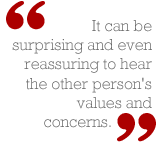







|

My friend Dr. Art Aron has created an exercise he calls Interpersonal Closeness Exercise (ICE) in getting to know someone.
Ideally you ought to have a partner for this exercise -- so you might want to print out this part of the lesson to share with an
acquaintance later. Meanwhile, you can follow the instructions and imagine how you might answer each item. That's a start -- but
keep in mind that the essence of the experience comes from sharing your response with someone, and listening to what he or she has to
say as well.
Instructions:
This exercise was intended for pairs of acquaintances who do not
know each other well. The questions and tasks are not designed to intrude on your privacy; your responses are entirely voluntary. The
purpose of this exercise, which we think you will enjoy, is for you and your partner to get to know each other. (Note: In this
exercise, the word "partner" refers to your co-participant in this exercise, not to your spouse or date outside this exercise).
Listed here are three sets of questions. Spend no more than 10 minutes on each set; you may wish to set a timer to signal the end of
the period, so you won't have to watch the clock. For each item, one of you should read the question aloud and answers it, then the other
person answers. For the next item, the other individual reads the item aloud and answer it, and so on, alternating who starts in each
trial. Take plenty of time with each item, doing what it asks thoroughly and thoughtfully.
When time is up for one set, finish the item you are working on. Then go on to the next set of items. Ready? You may begin!
Set I
- Given the choice of anyone in the world, whom would you want as a dinner guest?
- What would constitute a "perfect" day for you?
- For what in your life do you feel most grateful?
- If you could wake up tomorrow having gained any one quality or ability, what would it be?
Set II
- Is there something you've dreamed of doing for a long time? Why haven't you done it?
- What do you most value in a friendship?
- What is your most terrible memory?
- How do you feel about your relationship with your mother?
Set III
- Share with your partner an embarrassing moment in your life.
- Tell your partner something that you like about them already.
- If you were to die this evening with no opportunity to communicate with anyone, what would you most regret not having told
someone? Why haven't you told them yet.
- Your house, containing everything you own, catches fire. After saving your loved ones and pets, you have time to safely make a
final dash to save any one item. What would it be? Why?
Explanation:
In many ways, the items in this exercise mimic the natural conversation between two people as they get to know each other. In
Set I, items involve self-description, a "discovery phase" between new acquaintances, learning more about each other, requesting mostly
interesting and positive information. Set I items are easy and even fun to answer.
Set II begins more of a "revealing phase" of communication. These items get more personal, inviting difficult memories, regrets, and
more complex reflection. These are harder items to answer and you may "edit" more, holding some things back. It can be surprising and
even reassuring to hear the other person's values and concerns.
Set III includes elements of discovery and revelation, but add a new process, thinking of yourselves as a pair of friends -- a "we
phase," different from thinking in terms of "you" and "me." You still offer information about what you value and what you regret, but
the meaning of each answer is less obvious and harder to edit. For example, even you might not know what it means to realize which
specific item you'd rescue if your home were on fire. To reveal that to an acquaintance is somewhat risky, when you yourself haven't
studied or rehearsed the answer.
As you move from Sets I to III, you are simulating the progression of real conversation from superficial to closer and finally deep
stages of intimacy. Before we move along, consider these two questions:
- A simulation is like the real thing in some ways. But what are some qualities important to real interactions
that cannot be simulated in this exercise?
- It's easy to "hold back" any information you don't want to reveal. You're not connected to a lie detector, and you have
complete control over what you do or don't reveal to your partner. In real life, however, what are the costs and benefits of holding
things back? How do you feel when you haven't "told all" to the other person or when you have perhaps revealed more than you intended?

|



